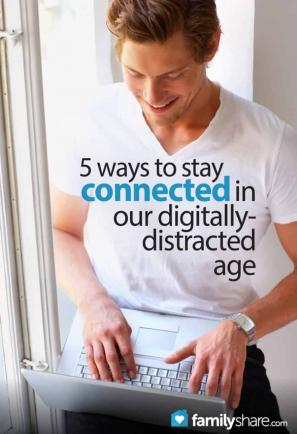
A far cry from the days of Timothy Leary and his maxim "turn on, tune in, and drop out,"� today's counterculture is not dropping out, but is logging in more now than ever. Ironically, a different child of the 60's was one of the primary driving forces that advanced this global trend. While Steve Jobs passed away in 2011, his impact continues to be as unparalleled as it is ubiquitous. Through his cutting-edge digital creations at Apple, coupled with the explosion of the Internet and other digital technological advances, the world has never been the same and we are "connected"� as no other time in history. But are we better off in our relationships?
The sheer explosion of the digital revolution has made author Thomas Friedman Nostradamus-like when he predicted the world would become increasingly "flat."
Not only has our world become "flat,"� it has become "hyper-connected."� We cannot go anywhere without our digital devices, be it our smart phones, our computers, or other digital devices. In fact, it seems we are increasingly in a constant state of readiness to connect, do face-time, email, text or play one of a million addictive digital games. However, while the quantity,speed and reach of our ability to connect in the community continue to increase at a dizzying pace, the "quality" of our connection with each other is diminishing.
Dr. Edward Hallowell, former Harvard faculty member and author of the book "Crazy Busy,"� has concluded, "What we're seeing, we've never seen in human history before. It's just the extraordinary availability and magnetism of electronic communication devices"� It can feel at times that our technology is managing us and not the other way around."� At the risk of sounding like a Luddite, in light of this growing evidence, perhaps we need to take a deeper look at the full impact of our always-connected state.
How can we stay relationally connected in our hyper-connected, digitally-distracted age? Here are five practical ways we can do this.
1.
Do an eye contact check
The next time you are talking with your friend, spouse, or co-worker, be self-aware enough to determine if you are looking directly into their eyes, or looking down at your smart phone while quasi-listening? Maintain eye contact and watch your conversations improve.
2.
Set it down, walk away
Physically set your smart phone, computer, iPad or other said digital device down, put it away, and literally walk away from it at least 3 times a day.
3.
Choose a time to unplug
Set an alarm at a pre-determined time every day that signals an exact time when you unplug and detach from the digital world. This means you are no longer available through your digital devices for the rest of that day or night.
4.
Ask for accountability
Invite your spouse, friend or roommate to keep you accountable in setting a pre-determined time to unplug and detach from your digital world.
5.
Start with Facebook
: Facebook has over 800 million active users. This means one in every nine people on Earth is on Facebook. Facebook users spend an average of 15 hours and 33 minutes a month on the site. If you reduce your time on Facebook by 10 percent this month, you have just created 1.5 more hours to invest into your face-to-face friendships.
Instead of allowing your digital world to control you, take control of your relationships by fully engaging yourself in undistracted, non-digital connecting time with your family and friends. When it comes to your relationships, perhaps it is time to tune in and log off.

